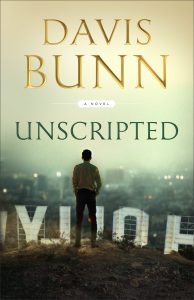With book sales totaling more than eight million copies, award-winning author Davis Bunn has kept fans on the edge of their seats with his page-turning fiction. Now he invites readers to believe in the power of redemption with his new novel, Unscripted (Revell): Hollywood comes at a high price—enter into the beating heart of Tinseltown with two characters determined to thrive in a cutthroat business. The novel is already getting high marks from Hollywood insiders. In this interview, Davis talks about the serious themes of the novel, the part of the story that most impacted him, and his own experiences as a screenwriter…
In your newest book, Unscripted, you cover some serious themes like betrayal and redemption. You have tackled these themes in some of your other novels. What do you think attracts readers to these type of stories?
 Great stories, regardless of whether they are on the screen or inside the pages of a book, need to address universal issues. The real issue for me, and what I seek to reveal in Unscripted, is that the process has one additional step. To move from betrayal to any positive outcome requires forgiveness. Only then can there be a hope of redemption.
Great stories, regardless of whether they are on the screen or inside the pages of a book, need to address universal issues. The real issue for me, and what I seek to reveal in Unscripted, is that the process has one additional step. To move from betrayal to any positive outcome requires forgiveness. Only then can there be a hope of redemption.
The struggle that forms the center of my new story is precisely this: How can an individual who has every right to hold on to rage and vengeance find the strength and a reason to forgive?
What scene do you most like about Unscripted? Which part remains with you most strongly?
One segment of the story has had a very intense impact on me. As I was writing, I felt like I had really nailed the ending. But going through it again, I sensed something else entirely.
Several times during my writing career, I have had the impression of scaling new heights, achieving something I hadn’t realized until it was over and done. That’s how I feel about the ending of Unscripted. The final fifty pages or so are the best conclusion to a story that I have ever written.
Who is your favorite character and why?
 I don’t have a favorite character. All of them have become very close friends. Perhaps in time one will begin to shine more brightly than the others.
I don’t have a favorite character. All of them have become very close friends. Perhaps in time one will begin to shine more brightly than the others.
But just now, all of them hold a very special place in my heart. Emma, Robin, Danny, Megan, Megan’s parents, even Aaron and JR in a somewhat twisted fashion—they all played their roles with a special intensity. Choosing a favorite would be like claiming I loved one child more than the others. I couldn’t. It would only hurt everyone’s feelings.
In the midst of a successful career as a novelist, you became involved in writing screenplays. How did that happen?
I have been fascinated with film since childhood, and I realized that if I was ever going to try my hand at this new direction, it needed to be now. So I took a screenwriting course at the British Film Institute and got to work.
In addition to your fiction, you continue to develop new ideas for the screen. Then last year, things began to happen for you in the film world. Tell us about that.
Three years ago, I had a screenplay made into a small feature film, which became the last film Fred Thompson ever starred in.
The following year, my Thomas Locke novel Emissary was acquired by a UK film group, and I was contracted to write the screenplay. That film is scheduled to enter preproduction this autumn.
Most recently a spec script (Hollywood-speak for a story written for the screen without a contract) was acquired by a major LA group. More about that in the coming months.
Visit Davis Bunn’s author page:
https://www.familyfiction.com/authors/davis-bunn/

Unscripted
Davis Bunn
Revell
Buy the book from our store!


